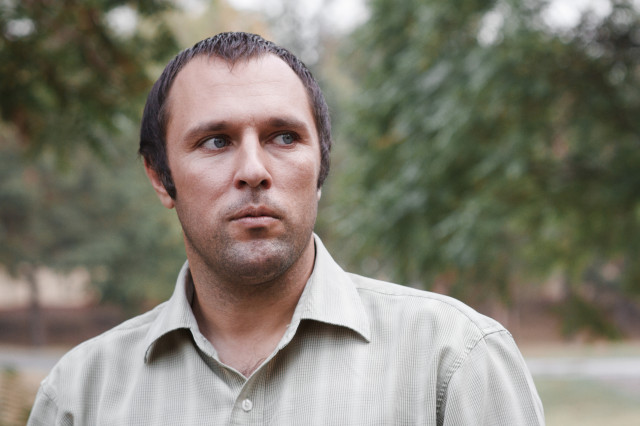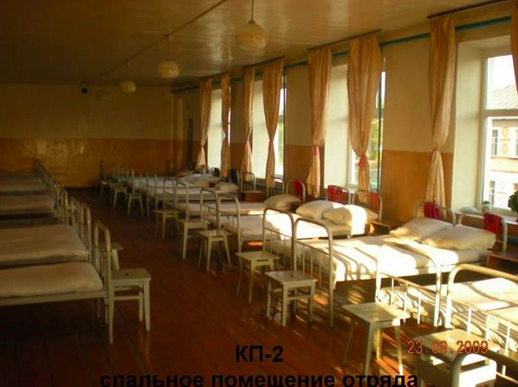
From Ukraine peace plans to Kazakh uranium—all that and more in our new nuclear digest
Our November Nuclear Digest by Bellona’s Environmental Transparency Center is out now. Here’s a quick taste of just three nuclear issues arising in U...
News

Publish date: May 8, 2014
News
After an initial rebuff from prison colony officials on Tuesday, a group of environmentalists and prisoners’ rights activists were yesterday allowed to visit Yevgeny Vitishko, the jailed ecological protester of the Sochi Winter Olympics, delivering to him hundreds of letters, dozens of books and kilograms of food.
Yevgeniya Chirikova, leader of the Khimki Forest Movement, several activists from Greenpeace Russia, and two members of the Public Monitoring Committee, a prisoners’ rights group associated with the Presidential Council on Human Rights, were finally allowed to visit Vitishko on Wednesday, Chirikova told Bellona by telephone from Moscow.
“He is in good health and spirits and the prison regime has not broken him at all,” Chirikova said. “He was fresh and friendly and grateful for the letters of support and the books.”
Chirikova said that both Greenpeace and the freevitishko.org website, which was set up to convey letters to Vitishko and collect financial donations to support for his family, had gathered some 400 letters, more than 30 books in Russia, Swedish and English and box upon box of food.
“Yevgeny is always especially grateful for letters and books,” said Chirikova, who was in an audibly bright mood that the visit had succeeded. “He says not to worry about delivering food, but he’s just being modest – the prison fare is bland.”
She also reported that his health was good. Vitishko’s health was initially an issue of concern before he was sent to the prison colony, as he had contracted a rending cough in Krasnodar’s remand prison, his lawyers said.
She said Vitishko offered his thanks to his supporters, whose notes of encouragement and inundation of reading material make his disproportionate imprisonment on the absurd charge of defacing a fence in a national forest easier to bear.
Vitishko’s spray-paint sentence
In February, Vitishko appealed a 3-year-suspended sentence he had been handed in 2012 by a Krasnodar Regional court for allegedly spray-painting the a construction fence surrounding the summer mansion of Alexander Teacher, the regional governor, which was being constructed on protected public lands.

Teacher was among several Olympic-boosting cronies of President Vladimir Putin who were given protected tracts of land and money from kickbacks and phony charitable funds to build lavish Black Sea cottages. The most famous of these is Putin’s own $1 billion baroque palace on the northwestern Black Sea coast – a boondoggle Vitishko and his colleagues helped expose.
The Krasnodar Regional court not only rejected Vitishko appeal as being disproportionate to the alleged crime, but turned it into a custodial one, sentencing him to three years in a prison settlement colony in Russia’s Tambov Region, 1,000 kilometers north of his Black Sea home of Tuapse, 70 kilometers northeast of Sochi.
Vitishko had actively participated in exposing the ecological devastation and corruption behind the Kremlin’s $51 billion sacred Olympic cow – which culminated in a damning report released during the Games – making him and his group, Environmental Watch on the North Caucasus, a nuisance to authorities and oligarchs.
Amnesty International has named Vitishko a Prisoner of Conscience, and his imprisonment sparked pickets and demonstrations throughout Russia and abroad.
Gazaryan’s Goldman prize again spotlights case
EWNC was continually pressured in the run up to the Olympics by Russia’s anti-terrorism and anti-extremism authorities not to make their ecological findings on the Olympics known so as “not to harm the image of the country.”

Vitishko’s case recently received soaring international boost when his friend, EWNC colleague, and co-author of the scathing Olympic report, Suren Gazaryan received the prestigious Goldman Environmental Prize. Gazaryan, who himself was tarred by numerous trumped up criminal charges by Russian for his ecological work, fled Russia in 2012, receiving political asylum in Estonia.
When he learned he was receiving the award, Gazaryan underscored Vitishko’s plight in interviews with Bellona, saying he wished he could switch places with his friend and serve the time himself, while Vitishko lived free.
Vitishko’s colony not bad, but still prison
Vitishko is serving his sentence in the Tambov Region’s KP-2, or Sadovaya facility, a light regime colony that differs starkly from so-called penal colonies, where other recent political prisoners like Nadezhda Tolokonnikova and Maria Alyohkina of Pussy Riot served their time.
“I was surprised by the relatively pastoral setting of the colony – I was expecting something more like what [Alexander] Solzhenitsyn had described,” Chirikova, a 2011 Goldman Prize laureate, told Bellona.
Prisoners largely engage in farming, and the visitation regime is far less strict than those observed by penal colonies and hard labor camps. Chirikova said Vitishko was allowed an hour each with two visitors in turns.
“But once you get past the traffic checkpoint and into the buildings, it is still clearly a prison,” said Chirikova.
On Tuesday, Chirikova, Public Monitoring Committee member Andrei Kolpakov, and the Greenpeace activists were turned away. First they were told Vitishko was not available for a visit because he had been sent to a distant work detail that day. Next they were told he could have no visitors because the wardens were not on duty. On the third attempt to see him on Tuesday, they were told there were no visitors’ rooms available.
Further urgings from the Moscow offices of the Public Monitoring Committee secured the Wednesday visit, Chirikova said.

“The first thing they told us was obviously a lie,” said Chirikova. “It’s a shame that they lied to us, but it’s not the worst thing that can happen in the zone,” she said, referring to Russia’s penal system. Vitishko is also donating his earnings from working on the prison farm to a local orphanage, she said.
Kolpakov told Bellona that his meeting with Vitishko was also satisfactory and that he considered Vitishko’s health and circumstances to be good.
Chirikova added that Vitishko is reading voraciously and is attempting to learn Swedish and improve his reading in English to tackle books he has received from supporters abroad.
She added he had no complaints about the conditions of his incarceration or the penal colony, and is keeping abreast of environmental issues.
“He’s up on all the ecological news and didn’t complain about the circumstances of his detention, although they are difficult because there is no such thing as easy circumstances in a Russian jail,” Chirikova said. “He is living in a dorm room with 140 other inmates. He cooks for himself from the groceries he is sent – he says the prison kitchen’s cooking is edible but doesn’t taste terribly good.”
Vitishko has received three groups of visitors prior to the one led by Chirikova since finally being located at the Sadovaya colony on February 28.
His transit to the colony was fraught with diversions and lies from prison officials and shady back-room deals between judges and prosecutors that he be sent there under armed guard, instead of turning himself over to the Federal Penal Service, as was his initial sentence.
For nearly a month, from the day of his sentencing on February 12, Vitishko’s lawyers, relatives, environmental colleagues, reporters from Bellona and members of the Public Monitoring Committee were unable to ascertain his whereabouts.

Our November Nuclear Digest by Bellona’s Environmental Transparency Center is out now. Here’s a quick taste of just three nuclear issues arising in U...

For three years now, Bellona has continued its work in exile from Vilnius, sustaining and expanding its analysis despite war, repression, and the collapse of international cooperation with Russia in the environmental and nuclear fields

The Board of the Bellona Foundation has appointed former Minister of Climate and the Environment Sveinung Rotevatn as Managing Director of Bellona No...

Økokrim, Norway’s authority for investigating and prosecuting economic and environmental crime, has imposed a record fine on Equinor following a comp...